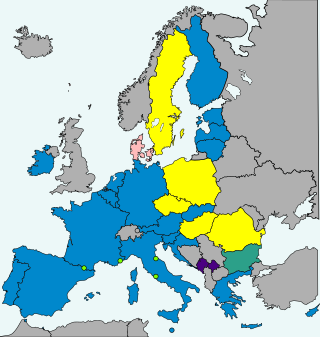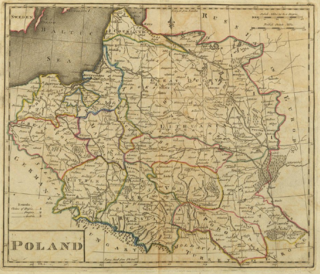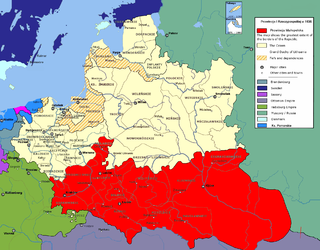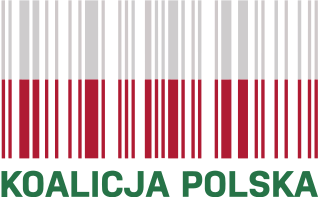
The Second Polish Republic, at the time officially known as the Republic of Poland, was a country in Central and Eastern Europe that existed between 7 October 1918 and 6 October 1939. The state was established in the final stage of World War I. The Second Republic ceased to exist in 1939, after Poland was invaded by Nazi Germany, the Soviet Union, and the Slovak Republic, marking the beginning of the European theatre of the Second World War. The Polish government-in-exile was established in Paris and later London after the fall of France in 1940.

Paweł Jasienica was the pen name of Leon Lech Beynar, a Polish historian, journalist, essayist and soldier.

The Polish–Lithuanian Commonwealth, or the First Polish Republic, formally known as the Kingdom of Poland and the Grand Duchy of Lithuania, or simply Poland–Lithuania, was a bi-confederal state, sometimes called a federation, of Poland and Lithuania ruled by a common monarch in real union, who was both King of Poland and Grand Duke of Lithuania. It was one of the largest and most populous countries of 16th- to 17th-century Europe. At its largest territorial extent, in the early 17th century, the Commonwealth covered almost 1,000,000 km2 (400,000 sq mi) and as of 1618 sustained a multi-ethnic population of almost 12 million. Polish and Latin were the two co-official languages, and Catholicism served as the state religion.

The Polish–Lithuanian union was a relationship created by a series of acts and alliances between the Crown of the Kingdom of Poland and the Grand Duchy of Lithuania that lasted for prolonged periods of time from 1385 and led to the creation of the Polish–Lithuanian Commonwealth, or the "Republic of the Two Nations", in 1569 and eventually to the creation of a unitary state in 1791.

Rzeczpospolita is a Polish nationwide daily economic and legal newspaper, published by Gremi Media. Established in 1920, Rzeczpospolita was originally founded as a daily newspaper of the conservative Christian National Party during interwar Poland. The paper's title is a translation of the Latin phrase res publica, and is part of the traditional and official name of the Polish state, "Rzeczpospolita Polska."

Rzeczpospolita is the official name of Poland and a traditional name for some of its predecessor states. It is a compound of the terms rzecz "thing, matter" and pospolita "common", a calque of Latin rés pública, i.e. republic, in English also rendered as commonwealth (historic) and republic (current).

The Constitution of the Republic of Poland is the supreme law of the Republic of Poland, which is also commonly called the Third Polish Republic in contrast with the preceding systems.

Dzikie Pola is a Polish role-playing game, set in the historical setting of the 17th century Polish–Lithuanian Commonwealth. It had two editions: first in 1997 and second in 2005.

Poland does not use the euro as its currency. However, under the terms of their Treaty of Accession with the European Union, all new Member States "shall participate in the Economic and Monetary Union from the date of accession as a Member State with a derogation", which means that Poland is obliged to eventually replace its currency, the złoty, with the euro.
Radom Confederation was a konfederacja of nobility (szlachta) in the Polish–Lithuanian Commonwealth formed in Radom on 23 June 1767 to prevent reforms and defend the Golden Liberties. It was formed by Russian envoy to Poland Nicholas Repnin and backed by the Russian Imperial Army as a response of Catholic nobility to the earlier Protestant confederations of Slutzk and Toruń, approximately 74,000 nobles declared their support for Radom Confederation.
Polish Republic is the official name of Poland. It may also refer to:

The ethnonyms for the Poles (people) and Poland include endonyms and exonyms. Endonyms and most exonyms for Poles and Poland derive from the name of the West Slavic tribe of Polans (Polanie), while in some languages the exonyms for Poland to derive from the name of another tribe – the Lendians (Lędzianie).

The following outline is provided as an overview of and topical guide to Poland:

The Reciprocal Guarantee of Two Nations, also Reciprocal Warranty of Two Nations, Mutual Pledge of the Two Nations and Mutual Assurance of the Two Nations, was an addendum, adopted on 20 October 1791 by the Great Sejm, to the Polish-Lithuanian Constitution of 3 May 1791. In the preamble of this guarantee the dualistic form of the state was confirmed and it had equal status to the Union of Lublin (1569).

Order of the Builders of People's Poland was the highest civil decoration of Poland in the times of the People's Republic of Poland.

Lesser Poland Province was an administrative division of the Crown of the Kingdom of Poland from 1569 until 1795 and the biggest province of the Polish–Lithuanian Commonwealth. The name of the province comes from the historic land of Lesser Poland. The name of the province did not imply its size, but rather its lesser seniority.

Rzeczpospolita Polska was the official monthly underground journal and mouthpiece of the Government Delegation for Poland, the highest authority of the Polish Underground State, accountable to the Polish government-in-exile located in London during the wartime occupation of its territory by two hostile powers. According to the historian Lewandowska, it acted as "a source of instruction and information" for Polish underground organizations in the field, including other underground publications, operating in occupied Poland. It was staffed by a network of professional writers both in Poland and correspondents in exile.

Polska Ludowa was a semi-official reference to the Polish state under Communism. The term was intended to imply the power of the working people in the state. It was a colloquial reference, including official speeches, but was also sometimes used in official documents.

The Polish Coalition is a political alliance in Poland. It is led by the Polish People's Party.
















